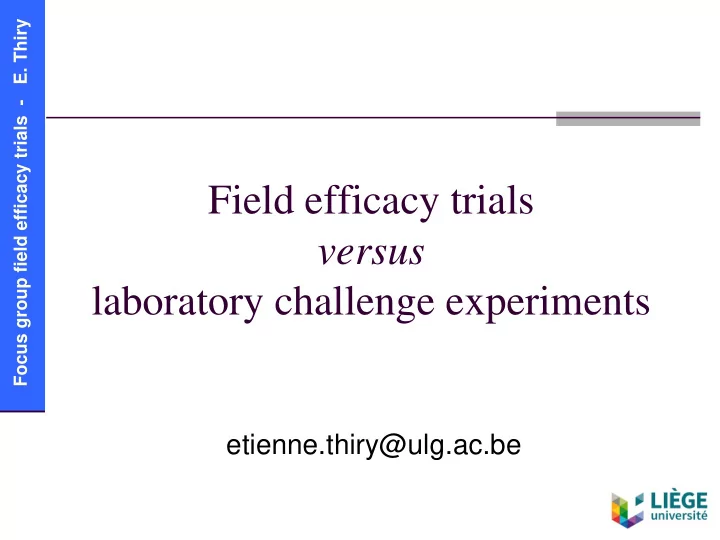

Focus group field efficacy trials - E. Thiry Field efficacy trials versus laboratory challenge experiments etienne.thiry@ulg.ac.be
Focus group field efficacy trials - E. Thiry Evidence-based veterinary medicine (EBVM) EBVM is the conscientious, explicit and judicious use of current best evidence in making decisions about the care of individual patients ABCD uses a classification of the levels of evidence in veterinary medicine: EBVM ranks controlled field trials (grade 1) better than experimental studies (grade 2) Lloret A. The process of evidence-based medicine. J Feline Med Surg. 2009 Jul;11(7):529 Thiry E, Addie D, Belák S, Boucraut-Baralon C, Egberink H, Frymus T, Gruffydd-Jones T, Hartmann K, Hosie MJ, Lloret A, Lutz H, Marsilio F, Pennisi MG, Radford AD, Truyen U, Horzinek MC. Feline herpesvirus infection. ABCD guidelines on prevention and management. J Feline Med Surg. 2009 Jul;11(7):547-55.
Focus group field efficacy trials - E. Thiry EBVM versus Koch’s postulates paradigm Laboratory challenge trial principle is based on the paradigm of the 3 Koch’s postulates However the field situation is obviously more complex Proposal (Sultana et al., 2017) : Koch’s hypothesis: « 1 pathogen + 1 host = disease » is therefore better formulated as: « X (pathogen/s) + Y (local milieu) + Z (individual host susceptibility) = disease » The laboratory challenge experiment could not be well representative of the complex field situation Sultana S, Sarker SA, Brüssow H. What happened to Koch's postulates in diarrhoea? Environ Microbiol. 2017 May 4. doi: 10.1111/1462-2920.13787.
Focus group field efficacy trials - E. Thiry Factors influencing the efficacy of veterinary vaccines Variability of pathogen Low variability: the challenge strain fits well High variability: the challenge strain might be poorly representative of the pathogen population Multiple challenge for multifactorial diseases Diversity of target animal Young – adult - senior animal Healthy – chronic illness Immunocompetent – immunocompromised Density and size of the target population (epidemiological diversity) Single household vs multiple household animals Production animals vs companion animals The laboratory challenge experiment explores only few of these factors
Focus group field efficacy trials - E. Thiry The « challenge » of the field trial Reflection of a complex « natural » situation (is it true?) (Veterinary Vaccinology, Pastoret et al., 1997, Elsevier, p.165) Quality (GCP) Randomisation and blinding Controlled studies Negative vs positive controls (in the case of existing vaccine) Sample quality Waiting for the natural challenge Right cohort size Allowing enough precision (reduction of prevalence/incidence) « N » may be high (especially with « positive » controls) Statistical significance depending on Significant decrease in prevalence/incidence in vaccinated group vs control group The outcomes of field efficacy trials are often disappointing
How to reconcile the accurate measurement Focus group field efficacy trials - E. Thiry of vaccine efficacy with the estimate of its efficacy in field conditions? Good challenge model Representative challenge strain / multiple challenge Reproduction of the disease Pathogen excretion / other measurable parameters (specific immune response) Possibility of OOI and DOI studies Surrogates of field trials Epidemiological modelling Meta-analyses Proposal: PEUR : Periodic Efficacy Update reports Reflecting the true use of the vaccine in the field Hampered by the likelihood of natural challenge Need for a scientific assessment
Focus group field efficacy trials - E. Thiry In conclusion Importance of a precise assessment of vaccine efficacy: laboratory challenge experiment Importance of the investigation of the pathogen, host and environment diversity But poor cost-benefit ratio of field efficacy trial Try alternative ways e.g. data obtained by post-autorisation surveillance (supported by epidemiological data on the incidence of the relevant pathogens) Higlhly dependent on the quality of data
Recommend
More recommend